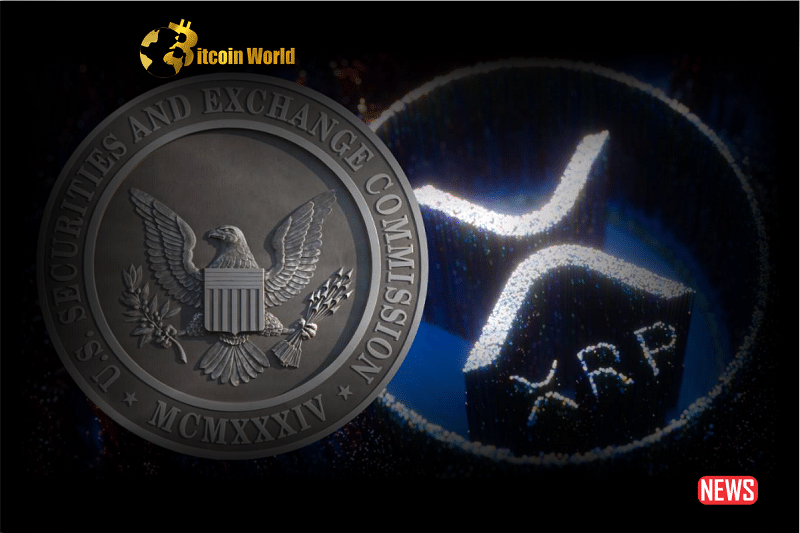The cryptocurrency world is buzzing after Judge Analisa Torres classified XRP as a digital asset, shaking things up for the U.S. Securities and Exchange Commission (SEC). This landmark ruling has cornered the SEC, forcing them to make some crucial decisions in the ongoing Ripple case. So, what exactly are their options? Let’s break it down.
What’s on the SEC’s Plate? Four Potential Paths Forward
Imagine being the SEC right now. Judge Torres’ decision has thrown a wrench in their gears, and they need to carefully consider their next step. According to cryptocurrency lawyer James A. Murphy, there are four main possibilities on the table. Let’s dive into each one:
1. The Provisional Appeal: A Fight Before the Finish Line?
This is considered the most likely move by many experts. A provisional appeal means the SEC would ask both Judge Torres and the 2nd Circuit Court of Appeals for permission to challenge the ruling *before* the entire case is over. Think of it as appealing a key decision mid-trial.
But it’s not as simple as just asking. To get the green light for this appeal, the SEC needs to prove a few key things:
- Significant Legal Question: The ruling raises important legal issues that need immediate attention.
- Difference of Opinion: There’s a genuine disagreement on the interpretation of the law.
- Substantial Advancement: An immediate appeal would significantly speed up and clarify the overall case.
Why might the SEC choose this route? Murphy suggests that the increasing political pressure on SEC Chairman Gary Gensler, coupled with the SEC’s approach of regulating the crypto industry through enforcement actions (often called “regulation by sanction”), could push them towards a provisional appeal. They might feel they need to challenge this precedent sooner rather than later.
2. Continuing the Fight Against Ripple Executives
Even with the ruling on XRP’s classification, the SEC can still pursue its case against Ripple CEO Brad Garlinghouse and co-founder Chris Larsen. This part of the lawsuit alleges that they aided and abetted Ripple’s violations of securities laws. This option allows the SEC to keep some pressure on Ripple’s leadership, regardless of the broader XRP classification.
3. A Shift in Strategy: Dropping Claims and Appealing?
Here’s a twist: the SEC could potentially drop the charges against Larsen and Garlinghouse altogether. This would clear the path for an immediate appeal on the XRP classification ruling without needing permission. This approach could streamline the legal process and focus directly on the core issue of whether XRP sales constituted securities offerings.
4. The Unlikely Settlement: Could They Make a Deal?
While always a possibility in legal battles, a settlement seems the least probable outcome at this stage. Why? Because settling would mean leaving Judge Torres’ ruling unchallenged. This precedent could significantly impact future SEC cases against other digital assets, something the agency likely wants to avoid.
Why These Next Few Weeks Matter
The coming weeks are going to be critical. The SEC’s response to Judge Torres’ ruling will be a major turning point in the SEC v. Ripple case. Everyone in the crypto space is watching closely, as the agency’s decision will not only impact Ripple but could also set a precedent for how digital assets are regulated in the United States.
What Does This Mean for the Future of Crypto Regulation?
The SEC is at a crossroads. Whether they opt for a provisional appeal, continue the fight against Ripple’s executives, change their strategy, or even consider a highly improbable settlement, their choice will have significant consequences. The crypto community is holding its breath, eager to see how this legal drama unfolds and what it means for the future of digital assets in the U.S.
Ultimately, the SEC’s decision in the Ripple case will send a strong signal about their approach to regulating the burgeoning cryptocurrency industry. Will they continue their aggressive enforcement tactics, or will this ruling force them to adopt a more nuanced and clearer regulatory framework? Only time will tell, but one thing is certain: the stakes are high.
Disclaimer: The information provided is not trading advice, Bitcoinworld.co.in holds no liability for any investments made based on the information provided on this page. We strongly recommend independent research and/or consultation with a qualified professional before making any investment decisions.


